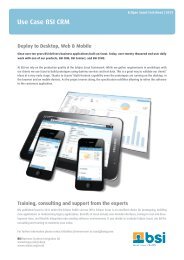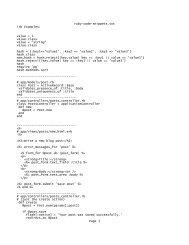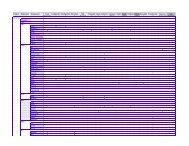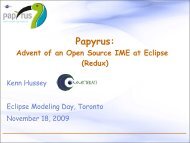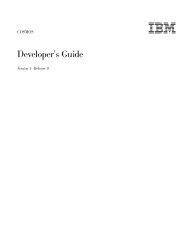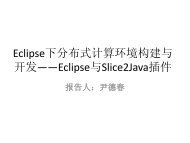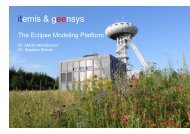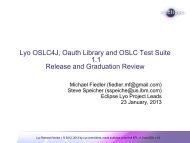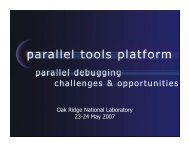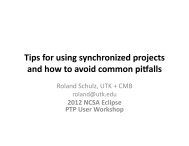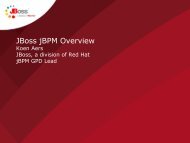Download
Download
Download
You also want an ePaper? Increase the reach of your titles
YUMPU automatically turns print PDFs into web optimized ePapers that Google loves.
used with other EFS supported file systems, for example a Zip file could be<br />
mounted into the workspace using an EFS Zip file implementation.<br />
Simply providing remote resources via EFS is not sufficient to provide the level of<br />
performance of remote development that may be required. The reason is that file<br />
operations on EFS remote files may cause the file to be transferred over the wire<br />
to a local cache folder.<br />
This is not desirable for performance reasons, for<br />
example indexing all the files in a project could cause all the files to be<br />
transferred locally.<br />
It is the responsibility of the<br />
remote plug-in to provide an implementation of EFS<br />
for accessing the remote files. The remote plug-in will probably also need to<br />
provide its own workspace<br />
projects and manage the resources in those projects.<br />
The C or C++ nature would then be applied to these projects allowing CDT to<br />
recognize them and add them to the CModel. This in turn enables all of the CDT<br />
functionality to work on the remote resources (by pretending<br />
they are local<br />
resources<br />
in the workspace). If the remote plug-in is not concerned with<br />
efficiency then this is all that it needs to provide. However, if the remote plug-in<br />
wants to provide a remote index as well, then it can participate in our proposed<br />
DAO service<br />
framework.<br />
(There is an alternate usage scenario that does not involve the necessity to<br />
provide<br />
an EFS implementation.<br />
It will be possible for an ISV to use CDT<br />
components<br />
directly without actually using CDT as a framework. In this case an<br />
implementation of EFS may not be required.)<br />
In order to enable remote search and index functionality in an efficient manner it<br />
would be necessary to have an agent on the remote system that provides an<br />
index for the files located there. In order to facilitate this we propose to provide<br />
stand-alone JAR files that contain the CDT parser and indexer subsystems. The<br />
goal<br />
is to make it possible to deploy the parser and indexer on a remote system<br />
where the Eclipse/CDT framework may not be available.<br />
There will be an extension point for contributing implementations of our proposed<br />
DAO service framework. This implementation will provide implementations of<br />
search and index functionality that will communicate with the agent on the remote<br />
system.<br />
There will be a DAO Manager component that will be responsible for mapping a<br />
workspace file to a DAO service. This mechanism will allow more that one DAO<br />
implementation to coexist (enabling local and remote projects to live side by<br />
side). If more than one project type is involved, for example if a local and a<br />
remote project are included<br />
in a search scope, then CDT must make use of each<br />
mapped<br />
DAO factory and combine the results.<br />
RemoteIndexDesign.doc<br />
Copyright ©2006 IBM Corporation<br />
Distributed under the Eclipse Public License v1.0<br />
Page 10 of 26



